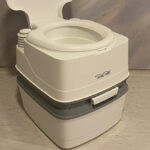Black water isn’t some strange variation of the substance that we use to survive, each and every day. It’s actually just a semi-polite way of referring to the storage tank that contains water flushed from your RV toilet. You’ve probably heard the term “gray water” before and this is a similar application.
A forty-gallon, black water tank will last a few days past two weeks for a single person and you can safely cut that down to about 7 days for a family of four. Dropping down to a thirty-gallon tank, you will get about 11 days for one person and 5 days for a family of four.
Of course, this is all assuming that no one in the family is gorging on Taco Bell, which has the potential to expedite changing the tank water. The general rule of thumb remains, the more you use it, the quicker it will reach its capacity.
What’s the Difference Between Black Water and Gray Water?
Gray water has always been a tame euphemism for “pee water,” water from your sinks and showers, and water that’s drained from your washing machine. It doesn’t include fecal matter or toilet paper.
Black water, on the other hand, is another euphemism that refers to the wastewater in the holding tank that is filled directly from your waste material flushed down the toilet in an RV. It’s basically everything that’s flushed down your RV toilet.
The black water tank in your RV isn’t an indefinite holding system, like the septic system that’s buried in back yards. It has to be changed and, depending on how frequently your toilets are used, it will have to be changed at regular or expedited times.
How Many Tanks Does an RV Have?
Normally, any recreational vehicle will come equipped with three, separate tanks. One is the black water tank, to hold waste that flows directly from the toilets, the second is the gray water tank for sinks and showers, and the third is a freshwater tank.
When you are at a campground—especially a campground with a ton of premium accommodations, you can hook your RV up to their systems, which makes it easy for you to get additional fresh water and replace the gray and black water in your tanks.
All three tanks are essential for camping, especially if you have to go the primitive route—or as primitive as you can go with an RV—and all three tanks are going to be maxed out on their usage.
How to Get Rid of Black Water?
When it comes time to dump your wastewater, you’ll do both the gray water and the black water at the same time. Of course, it’s typically designed to be that way—in terms of the outlet hoses that will be available at a campground.
Make sure you have some waste gloves—either latex or other, waterproof gloves
Connect the two outlet hoses to both the gray and black water tanks
Connect the other end to the dump station
Open the valve to dump the black water
Open the valve to dump the gray water
Run fresh water through the line
Disconnect from the RV side first
Disconnect from the dump station
The primary reason that you want to dump the black water first, is that it will be the one that’s full of the most solid material and you will want to flush that material through the line with the gray water. The additional freshwater flush will ensure that there is nothing left in the line.
Once you’re done with that, you’re good for a while, however, regardless of how many people you have in the RV, it’s always a good idea to dump the black water every five days or so. If it reaches ⅔ full, passes five days, or there is a noticeable smell, it needs to be dumped.
Black water can build up quickly and add up, especially if you are traveling with a large family and for an extended period of time. It’s always important to keep an eye on it because it may reach the point where it needs to be dumped well inside the five-day window.
It’s also very likely that you will smell it when it comes time to be changed. If the odor is escaping into the RV, it’s definitely reached the point where it needs to be changed.
Should You Use Bleach?
After you’ve drained your tank, it’s beneficial to pour an ounce or two of bleach down the toilet and into the tank. It will help sanitize and clean everything in your tank and lines. You can do the same with your gray water tank as well.
You should also take the time to follow the bleach with some tank cleaner, such as Unique, or a similar cleaner. No matter what you do, eventually, the tanks will begin to stink and some of that smell will permeate up and into the RV with you.
The best way to combat this is to do a thorough cleaning periodically. For that, you’ll need plenty of bleach and a lot of freshwater. The best time to do this is when you are traveling and the toilets aren’t being used for long periods of time.
Start by pouring water into your tank by the gallon. For every gallon of water you add, also add a ¼ cup of bleach to go along with it. You can also add dish detergent as it won’t harm the system at all and will aid the bleach in cleaning the tank of bad bacteria.
Once your tank is about half full, leave it as it is throughout the period that you’re traveling. This way, the freshwater, bleach, and dish detergent will shift around inside the tank, effectively cleaning itself as you drive.
When you get to your destination, dump your bleach, water, and dish soap mix at the dumping station, just like you would normally do when dumping out your black water.
Can You Dump Your Black Water at Home?
That all depends on your situation at home. A Home Owner’s Association may not allow you to dump your wastewater into the residential sewage system. If you have your own septic system, along with a way to hook up to it, you can certainly do so as long as it doesn’t violate any ordinances.
If you have a system with outlets to which you can connect your hoses, make sure that you connect it on the solid waste side and not the other side. Trying to dump on the opposite side can cause significant damage to your system and you may have to end up replacing it.
If that’s the case, expect to fork over thousands of dollars. If you have your own system and you want to dump your black water tank at home, make sure that you understand exactly what you’re doing so that you don’t cause catastrophic damage to your septic system.
If you’re on city water, it’s highly unlikely that you will be allowed to dump your black water tank. The first thing that you want to do is contact your HOA (if applicable), followed by contacting your city’s wastewater treatment service.
You need to get a definitive answer from both before you start. If it’s against the law to do so, both entities will be able to inform you of the fact.
All Things Considered
Owning an RV means dumping your tanks regularly and replacing your freshwater. It’s all a part of the process of recreational vehicle ownership. So long as you keep up with it and maintain your system, you should never have any problems with your RV’s waste system.
The last thing you want is to end up camped out in the middle of nowhere with an overflowing black or gray water tank.








